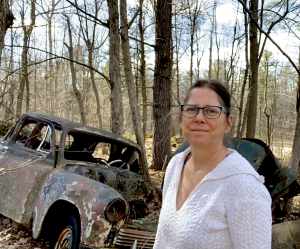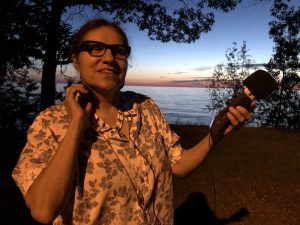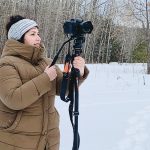Lab Co-Directors
Mary Bunch  is an Associate Professor of Cinema and Media Arts and a Canada Research Chair in Critical Disability, Vision and the Arts at York University. She mobilizes queer, feminist, disability and decolonial frameworks to better understand peripheral worldmaking imaginaries in media arts. A member of York’s Digital Justice Research cluster, and executive committee member of Sensorium Centre for Digital Arts and Technology, she connects embodied and multisensory engagements with image and story, to a correspondent political ontology – that is, the social and political implications of different perceptions of reality. Her theoretical concept development emerges both alongside, and through her creative practice. Her theory of access aesthetics as worldmaking proposed that access aesthetics is a political ontology. She develops this approach in “Blind Visuality in Bruce Horak’s Through a Tired Eye” (Studies in Social Justice, 2021) and “Access Aesthetics – Toward a Prefigurative Cultural Politics,” which introduces her co-edited special issue on Access Aesthetics of Public: Art|Culture|Ideas. Bunch co-created the media arts works Gather, Resonance, Emerging from the Water BETA, and Parkway Forest Time Machine. She has published articles in such journals as Culture, Theory and Critique, the Journal of Literary and Cultural Disability Studies; and Feminist Theory.
is an Associate Professor of Cinema and Media Arts and a Canada Research Chair in Critical Disability, Vision and the Arts at York University. She mobilizes queer, feminist, disability and decolonial frameworks to better understand peripheral worldmaking imaginaries in media arts. A member of York’s Digital Justice Research cluster, and executive committee member of Sensorium Centre for Digital Arts and Technology, she connects embodied and multisensory engagements with image and story, to a correspondent political ontology – that is, the social and political implications of different perceptions of reality. Her theoretical concept development emerges both alongside, and through her creative practice. Her theory of access aesthetics as worldmaking proposed that access aesthetics is a political ontology. She develops this approach in “Blind Visuality in Bruce Horak’s Through a Tired Eye” (Studies in Social Justice, 2021) and “Access Aesthetics – Toward a Prefigurative Cultural Politics,” which introduces her co-edited special issue on Access Aesthetics of Public: Art|Culture|Ideas. Bunch co-created the media arts works Gather, Resonance, Emerging from the Water BETA, and Parkway Forest Time Machine. She has published articles in such journals as Culture, Theory and Critique, the Journal of Literary and Cultural Disability Studies; and Feminist Theory.
Dolleen Tisawii’ashii Manning is a member of Kettle and Stoney Point First  Nation, an interdisciplinary artist and scholar currently residing in Toronto. She is a Queen’s National Scholar in Anishinaabe Knowledges, Language and Culture in the Department of Philosophy and Graduate Program in Cultural Studies at Queen’s University. She received a PhD from the Centre for the Study of Theory and Criticism at Western University (2018), and holds graduate degrees in critical theory (MA, Western, 2005), and in contemporary art (MFA, Simon Fraser, 1997). Working at the intersection of Anishinaabe ontology, critical theory, phenomenology, and art, she attends to imaging practices, epistemological sovereignty, and the debilitating impact of settler colonial logics. Manning points to her early childhood grounding in her mother’s Anishinaabe cultural lessons as her primary philosophical influence and source of creativity, which are integrally interwoven. Turning to Ojibwe concepts such as mnidoo (spirit or other-than-human) she proposes an interrelational theory of consciousness that involves a possession by these living potencies. This possession transmits to Anishinaabe visional modes and the experience of time and imaging itself.
Nation, an interdisciplinary artist and scholar currently residing in Toronto. She is a Queen’s National Scholar in Anishinaabe Knowledges, Language and Culture in the Department of Philosophy and Graduate Program in Cultural Studies at Queen’s University. She received a PhD from the Centre for the Study of Theory and Criticism at Western University (2018), and holds graduate degrees in critical theory (MA, Western, 2005), and in contemporary art (MFA, Simon Fraser, 1997). Working at the intersection of Anishinaabe ontology, critical theory, phenomenology, and art, she attends to imaging practices, epistemological sovereignty, and the debilitating impact of settler colonial logics. Manning points to her early childhood grounding in her mother’s Anishinaabe cultural lessons as her primary philosophical influence and source of creativity, which are integrally interwoven. Turning to Ojibwe concepts such as mnidoo (spirit or other-than-human) she proposes an interrelational theory of consciousness that involves a possession by these living potencies. This possession transmits to Anishinaabe visional modes and the experience of time and imaging itself.
Postdoctoral Fellows
Brad Necyck
Graduate Student Research Associates
 Lia Tarachansky is an award-winning Israeli-Russian journalist and documentary filmmaker. Her films include No One Knows How To Make A Revolution (2012, BBC), On The Side Of The Road (2013, Naretiv Productions), Ethnocracy: Israel’s African Refugees (2015, TeleSUR), and two experimental shorts Ocean (2017, Naretiv Productions) and Mosqobiyya (2017, Naretiv Productions). She is currently co-directing two feature investigative films about the alt-right in Israel and how it is transforming the political-colonial conflict into a religious one. She is currently pursuing a PhD in Cinema and Media Studies at York University where is learning about Augmented Reality and other new media and how they can be used in processes of counter-mapping and decolonization in Israel/Palestine.
Lia Tarachansky is an award-winning Israeli-Russian journalist and documentary filmmaker. Her films include No One Knows How To Make A Revolution (2012, BBC), On The Side Of The Road (2013, Naretiv Productions), Ethnocracy: Israel’s African Refugees (2015, TeleSUR), and two experimental shorts Ocean (2017, Naretiv Productions) and Mosqobiyya (2017, Naretiv Productions). She is currently co-directing two feature investigative films about the alt-right in Israel and how it is transforming the political-colonial conflict into a religious one. She is currently pursuing a PhD in Cinema and Media Studies at York University where is learning about Augmented Reality and other new media and how they can be used in processes of counter-mapping and decolonization in Israel/Palestine.
Former Artist In Residence
jes sachse
 Presently living in Tkaronto, jes sachse is an artist, writer and curator who addresses the negotiations of bodies moving in public/private space and the work of their care. Often found marrying poetry with large scale sculptural forms, their work has been presented and supported by Dancemakers, the Centre de Création et Recherche O Vertigo (Montréal), Harbourfront Centre, among other centres. Their work has appeared in and been profiled by NOW Magazine, The Peak, Canadian Art, C Magazine, CV2 -The Canadian Journal of Poetry and Critical Writing, Mobilizing Metaphor: Art, Culture and Disability Activism in Canada, and the 40th Anniversary Edition of Our Bodies, Ourselves
Presently living in Tkaronto, jes sachse is an artist, writer and curator who addresses the negotiations of bodies moving in public/private space and the work of their care. Often found marrying poetry with large scale sculptural forms, their work has been presented and supported by Dancemakers, the Centre de Création et Recherche O Vertigo (Montréal), Harbourfront Centre, among other centres. Their work has appeared in and been profiled by NOW Magazine, The Peak, Canadian Art, C Magazine, CV2 -The Canadian Journal of Poetry and Critical Writing, Mobilizing Metaphor: Art, Culture and Disability Activism in Canada, and the 40th Anniversary Edition of Our Bodies, Ourselves